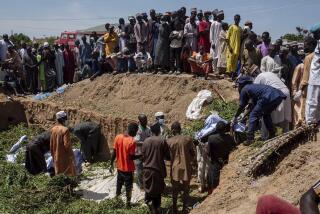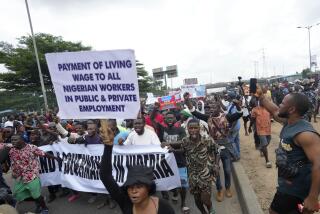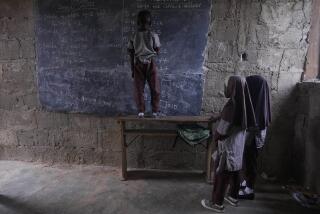Sectarian strife roils Nigeria amid strike
- Share via
Reporting from Johannesburg, South Africa, and — Unrest continued to spread across Nigeria on Tuesday amid new sectarian violence and a nationwide strike over fuel prices and government corruption in the oil-rich country.
Police said one person was killed when a mosque and Islamic school were attacked in Benin City, in the south of the country. Ten people were reportedly arrested in the attack, the latest religion-fueled violence in a country divided between a predominantly Muslim north and a largely Christian south.
In recent weeks, the radical Muslim sect known as Boko Haram, which seeks the implementation of sharia, or Islamic law, has attacked churches and other civilian outposts. The group was responsible for 510 deaths in Nigeria last year, according to a count maintained by the Associated Press.
Meanwhile, the general strike entered its second day Tuesday, with pedestrians milling about the empty streets of Nigeria’s cities, some setting up bonfires and roadblocks at intersections. The strike appeared to be paralyzing Nigeria’s economy, closing most markets, schools, offices and gas stations, though some informal traders catered to those in the streets.
With public transportation at a standstill, most people chose to stay home, monitoring news coverage on television and radio. But a coalition of civil society groups, trade unions and students gathered for a second day of largely peaceful public protests. On Monday, police in Lagos and Kano opened fire on strikers, killing at least three people and injuring dozens, according to police officials.
The strike is in large part a reaction to a unilateral New Year’s Day move by President Goodluck Jonathan to end fuel subsidies that had kept gasoline prices artificially low in Africa’s most populous nation. Overnight, the price of gas more than doubled to at least $3.50 a gallon, from about $1.55 a gallon.
“For the past 50 years, this country has not been known for its profits, but for corruption,” said Yinka Odumakin, a spokesman for Save Nigeria Group, a civil society organization that includes leaders of opposition parties. “We are responding to long-standing economic injustice, and this move to increase the fuel price means that ordinary people cannot afford to live.”
Many Western economists have lambasted the subsidy program as fiscally unsustainable and rife with corruption. But its sudden end galvanized consumers around the country, who regarded it as one of the few benefits they received from their government.
Nigeria exports more than 2.1 million barrels of crude oil a day and is one of the leading suppliers of crude to the United States. For decades, government officials have allegedly embezzled billions of dollars in public funds, leaving many Nigerians impoverished despite the country’s oil wealth.
Steps toward greater transparency and democracy have been halting. Today, most of the country’s 160 million people still live on less than $2 a day.
“This is a struggle by the Nigerian people for good governance, basically to make government accountable to the citizens,” said Fidelis Duker, 41, a filmmaker in Lagos. “There is a demand for total eradication of corruption in the society.”
Some critics say the government had promised to hold town hall-style meetings across the country, but went ahead with the subsidy cut after only one such meeting in Lagos.
“You cannot have dialogue after you have taken a decision,” said Femi Falana, a lawyer and human rights activist, who was one of thousands participating in Tuesday’s demonstrations in Lagos’ Gani Fawehinmi Park.
By ending the fuel subsidies, government officials say, they expect to save at least $6 billion this year, freeing funds for infrastructure development, such as roads and power stations.
“In 2011, spending on the subsidy came up to 25% of total expenditure in the budget, more than education, health and agriculture combined,” said Bismarck Rewane, chief executive of the Lagos-based consulting firm Financial Derivatives.
Despite its vast oil reserves, Nigeria imports refined petroleum products because it lacks sufficient refining capacity.
The Jonathan administration claims the austerity measures will send a message of fiscal responsibility to international investors who might repair and maintain the country’s refineries, which have fallen into disrepair after decades of mismanagement.
Economists say the biggest beneficiaries of fuel subsidies are the nation’s highest-earning households because they use more petroleum products. In Africa, 65% of all fuel subsidies go to the wealthiest 40% of households, according to a 2010 report by the International Monetary Fund.
But the price increase affects everyone and was felt quickest by the poorest.
“Ending the fuel subsidy is not just about people who put gas in their tanks having to pay a bit more. It affects everyone, from those who use public transportation to the price of food and all other commodities that move by road,” said Catherine Grant, an economist with the South African Institute of International Affairs.
“And Nigeria, like many countries in Africa, still relies on fuel for electricity, such as diesel for generators,” she said.
Previous governments had suggested curtailing the fuel subsidy program, but backed down after civil unrest.
“Once they are in place, subsidies of any kind are extremely difficult to remove,” Grant said.
Protesters say they will continue the strike until the government reinstates the subsidy program.
“President Jonathan has inherited a credibility problem and is now in a classic example of being between a rock and a hard place,” said Rewane. “If he concedes and reverses on the subsidy, he loses credibility and will face even more demands. But if he doesn’t concede, he will be seen as intransigent.”
Other observers say the government is not likely to back down until its main industry feels the pinch of the mass action.
“If the strike can stop the oil production then the government will know something is happening,” said Remi Adepoju, 30, a lawyer in Lagos.
Special correspondents Wilson reported from Johannesburg and Okhai from Lagos.
More to Read
Sign up for Essential California
The most important California stories and recommendations in your inbox every morning.
You may occasionally receive promotional content from the Los Angeles Times.










